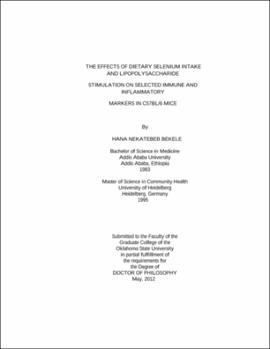| dc.contributor.advisor | Stoecker, Barbara J. | |
| dc.contributor.author | Bekele, Hana Nekatebeb | |
| dc.date.accessioned | 2013-11-26T08:26:16Z | |
| dc.date.available | 2013-11-26T08:26:16Z | |
| dc.date.issued | 2012-05 | |
| dc.identifier.uri | https://hdl.handle.net/11244/6852 | |
| dc.description.abstract | Scope and Method of Study: | |
| dc.description.abstract | This was an experimental study which investigated the effect of dietary selenium and LPS stimulation on immune markers of T and B cells in C57BL/6 mice by using bone marrow cell numbers, peripheral white blood cells counts and biochemical markers. Flow cytometer analysis was done to assess number of B and T cells, lymphocytes, granulocytes and monocytes in bone marrow. Liver functions (ALP, ALT and ALB) were assessed using a clinical analyzer. Commercially procured enzyme linked immunosorbent assay (ELISA) kits were used to analyze IL-12, IFNy and IgG2a; plasma Se was analyzed using an inductively coupled plasma mass spectrometer (ICP-MS). Plasma glutathione peroxidase (GSH-Px) activity was analyzed using a kinetic assay and the total antioxidant capacity (TAC) was analyzed using a colorimetric method. | |
| dc.description.abstract | Findings and Conclusions: An amount of inflammation that did not significantly reduce body weight and showed no clinical signs of illness caused differences in most of the biomarkers selected for this study. At necropsy, plasma Se was significantly affected by dietary Se intake (0.099±0.026 mg/L in Se deficient group to 0.197±0.020 mg/L for 4mgSe/kg group). Interaction affected peripheral differential counts of white blood cells. Mice fed 4 mg Se added/kg diet with LPS had significantly lower numbers of lymphocytes compared to other groups. Peripheral neutrophil numbers were significantly higher for mice fed 4 mg Se added/kg diet with LPS and lower for mice fed 0.2 mg Se added/kg diet compared with placebo. LPS introduced a significant (p<0.05) increase in number of Th-cells (CD4+) (0.534x10^6/mL vs 0.906x10^6/mL, B-cells (B220+) (2.53x10^6/mL vs 3.35x10^9/L), and monocytes (CD31neg LY-C6^hig ) (0.765 x10^6/mL vs 0.088 x 10^6/mL) compared to placebo groups. In addition T-cell numbers were greater with 4.0 mg Se /kg diet (p<0.02). GSH-Px activity increased in mice from 34.057 mU/L in Se 0.02 mg/kg diet group to 1024.82 mU/L in Se 4mg/kg diet group (p<0.0001). The TAC was shown to change from 6.02 mM in mice fed deficient diet to 8.38 mM in mice fed with 4.0 mg/kg added Se diet (p<0.001). Significant changes in plasma alkaline phosphatase (p<0.036) level by dietary Se were also observed. The hypothesis that Se can affect the immune system is supported by a consistent body of scientific evidence including the results of our study. An evaluation of the possible therapeutic use of Se supplementation to enhance immunity warrants further well-planned experimental studies. | |
| dc.format | application/pdf | |
| dc.language | en_US | |
| dc.rights | Copyright is held by the author who has granted the Oklahoma State University Library the non-exclusive right to share this material in its institutional repository. Contact Digital Library Services at lib-dls@okstate.edu or 405-744-9161 for the permission policy on the use, reproduction or distribution of this material. | |
| dc.title | Effects of dietary selenium intake and lipopolysaccharide stimulation on selected immune and inflammatory markers in C57BL/6 mice | |
| dc.contributor.committeeMember | Smith, Brenda J. | |
| dc.contributor.committeeMember | Lucas, Edralin A. | |
| dc.contributor.committeeMember | Perry, Katye M. | |
| osu.filename | Bekele_okstate_0664D_12035.pdf | |
| osu.accesstype | Open Access | |
| dc.type.genre | Dissertation | |
| dc.type.material | Text | |
| dc.subject.keywords | gsh-px | |
| dc.subject.keywords | immunity | |
| dc.subject.keywords | plasma selenium | |
| dc.subject.keywords | selenium | |
| dc.subject.keywords | tac | |
| thesis.degree.discipline | Human Sciences | |
| thesis.degree.grantor | Oklahoma State University | |
